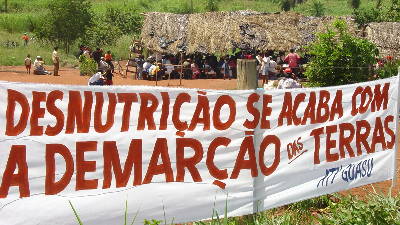Former FIAN Brazil Secretary General Leads President Lula’s Anti-Hunger Programs
Valéria Burity has been advocating for the right to food for almost eight years as FIAN Brazil’s Secretary General. Now, with a key position inside the new government of President Lula da Silva, she has the challenge of restoring the food security programs dismantled by former president Jair Bolsonaro and promoting food sovereignty in a country where 50% of the population faces some degree of food insecurity.
 In 2022, Brazil returned to the UN Food and Agriculture (FAO) Hunger Map after eight years absence. Former FIAN Brazil Secretary General Valéria Burity now faces the challenge of restoring the food security system that former President Jair Bolsonaro dismantled. This system is composed of the National Council for Food Security and Nutrition (CONSEA), a key consultation body bringing together civil society and the government, the Interministerial Chamber on Food and Nutritional Security (CAISAN) and the National Conference on Food and Nutritional Security. This institutional structure exists both at the state and municipal levels. The CONSEA, for instance, was re-established on February 28, 2023 by President Lula da Silva in an effort to include a diversity of voices in the fight against hunger.
In 2022, Brazil returned to the UN Food and Agriculture (FAO) Hunger Map after eight years absence. Former FIAN Brazil Secretary General Valéria Burity now faces the challenge of restoring the food security system that former President Jair Bolsonaro dismantled. This system is composed of the National Council for Food Security and Nutrition (CONSEA), a key consultation body bringing together civil society and the government, the Interministerial Chamber on Food and Nutritional Security (CAISAN) and the National Conference on Food and Nutritional Security. This institutional structure exists both at the state and municipal levels. The CONSEA, for instance, was re-established on February 28, 2023 by President Lula da Silva in an effort to include a diversity of voices in the fight against hunger.
During Bolsonaro’s presidency, hunger levels skyrocketed even though Brazil is one of the world’s top four food producers. The FAO put the country back on the Hunger Map when the numbers of people suffering chronic hunger rose from 2.5% to 4.1%. Almost a third of the population (30%) have difficulties obtaining food, and 15% (33.1 million people) go hungry every night, according to a report by Rede Penssan.
The number of people facing hunger almost doubled between 2019 and 2021 after 24 consecutive years of falling food insecurity. Some of the causes include Bolsonaro’s dismantling of food programs, President Michel Temer’s neoliberal policies from 2016 to 2018 which encouraged corporate capture of land and natural resources, a sharp reduction of the government’s social welfare spending, the COVID-19 crisis, and the global rise of food prices.
Now, Lula da Silva’s government intends to redress the worsening hunger situation. The president has declared this to be one of the main priorities of the new government, setting up a chamber to coordinate the actions of 24 ministries working to end hunger. Valéria Burity will coordinate this task as the Extraordinary Secretary to Fight Hunger in the Ministry of Social Development.
Her first objective is to rebuild the federal structures and institutions dismantled by Bolsonaro which were dedicated to guaranteeing the Right to Food and Nutrition. Along with CONSEA and CAISAN, there is the National Plan for Food and Nutrition Security (PLANSAN), which will include emergency and structural measures.
All these institutions will work together to form an emergency plan to reduce hunger through a range of actions. These include an increase in budget of the anti-poverty programme Bolsa Familia and in the minimum wage, more funds to make school meals healthier, and programs to source the state’s food consumption from small-scale farmers.
However, structural drivers of food insecurity such as sharp inequalities and racism, and land concentration also need to be addressed to ensure adequate and nutritious food. There are also plans for agrarian redistributive reform to ensure the right to land of rural communities most affected by hunger, tax reforms to counter inequalities, and the establishment of food reserves to combat food price volatility. All these actions will be directed towards restructuring food systems. On a personal level, Valerie believes that pesticides have gone through a major liberalization in the last decades and that this “is one of the challenges to guarantee adequate food”.
Burity understands that this will be a challenging task, especially in a coalition government lacking a common vision of the importance of food sovereignty and other underlying issues related to the right to food. “This is not an easy task,” she explains “but Lula is very engaged with ending hunger, and we are backed by a strong civil society”.
For media inquiries, please contact Clara Roig at roig@fian.org


